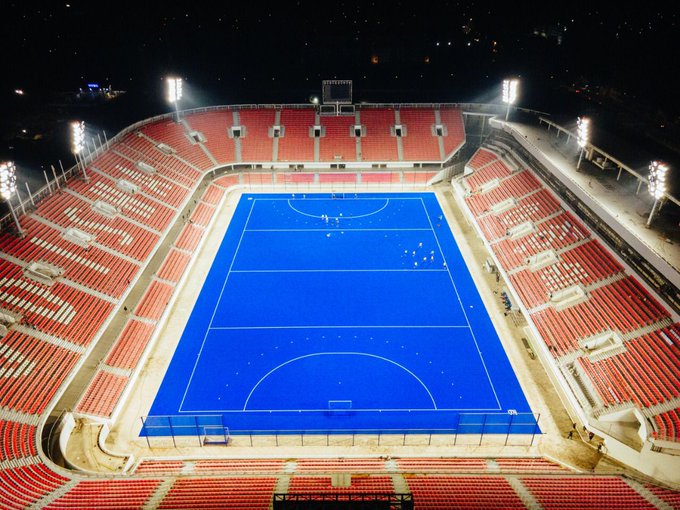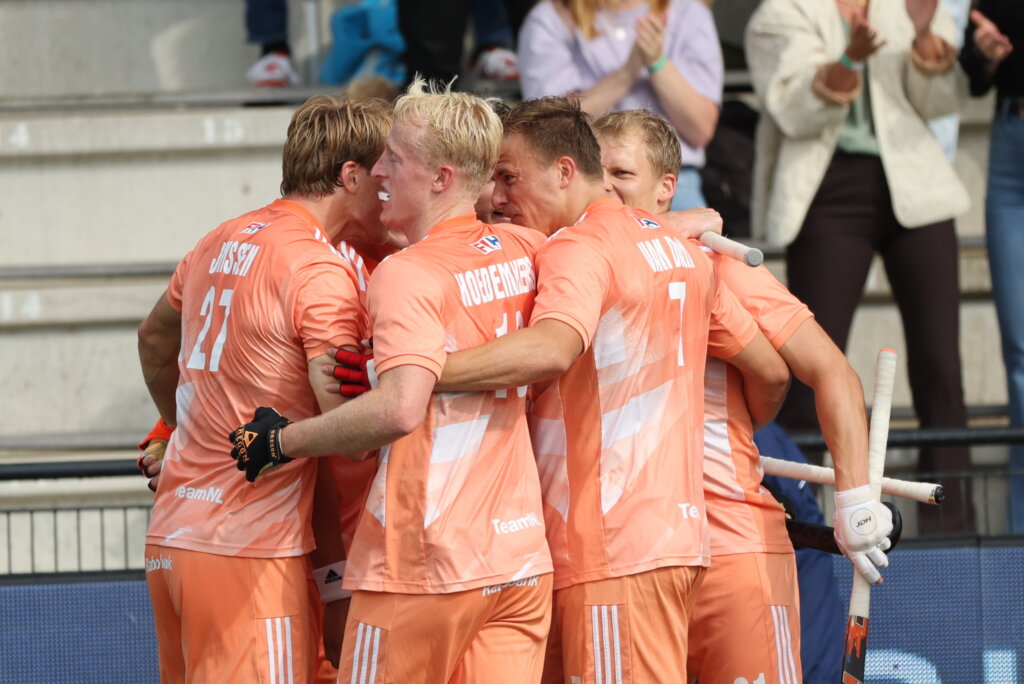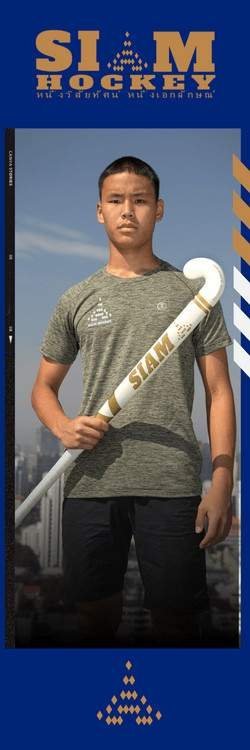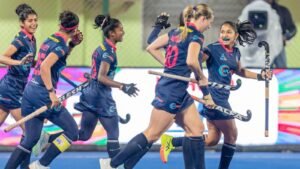The men’s world championship in India is about to begin. The Oranje Heren are on the hunt for their fourth world title and the first since 1998. To warm you up for this global clash, we have listed a number of things so that you are well prepared for the tournament.
What happened during the last edition in 2018?
The previous edition was also India in 2018. Back then it was only played in Bhubaneswar. Belgium captured the world title for the first time in history by beating the Orange Men after shoot-outs in the final. After regular time, the score was 0-0. Bronze was there for Australia who won 8-1 against England.
The Oranje Heren started the group phase with a 7-0 win over Malaysia. After the heavy defeat against Germany (4-1), Pakistan won 5-1. Canada was defeated 5-0 in the crossover, after which host country India was tied 2-1. In the semi-finals, shoot-outs were necessary to beat Australia (2-2). In the final, the Orange Men lost out in the shoot-out series.
Play location
For the first time in history, the World Cup will be played in two separate host cities: Bhubaneswar and Rourkela. Bhubaneswar, the capital of the Indian state of Odisha, will host the World Cup for the second time after 2018. 24 of the 44 matches will be played at Kalinga Stadium . The iconic hockey temple has been the official home of the Indian national teams for several years now. The stadium has a capacity of 16,000 spectators. The Oranje Heren will play their last of the three group matches in Kalinga Stadium on January 19 against Chile.
The Oranje Heren will play the other two group matches, against Malaysia (January 14) and New Zealand (January 16), in Rourkela, a city in the north of the state of Odisha. A brand new stadium has been built for the fifteenth edition of the World Cup: Birsa Munda International Hockey Stadium . With a capacity of more than 20,000 spectators, it is one of the largest hockey stadiums in the world. Twenty World Cup matches are played, all of which were sold out within a week.

Het Birsa Munda International Hockey Stadium in Rourkela
Who’s taking part?
Sixteen countries are participating in the world championship, divided into four groups, each with four countries. Group A includes Australia, Argentina, France and South Africa. Defending champion Belgium, Germany, South Korea and Japan form Group B. The Netherlands will play in Group C against Malaysia, New Zealand and Chile and in Group D, host country India is seeded with England, Spain and Wales.
Previous editions
The men play the fifteenth edition of the World Cup, which has been officially on the calendar of the international hockey federation since 1971. A total of six countries have won world gold in history: the Netherlands, Pakistan, Australia, (West) Germany, India and Belgium. The record holder is Pakistan with four world titles (1971, 1978, 1982 and 1994), followed by the Netherlands (1973, 1990 and 1998) and Australia (1986, 2010 and 2014) with three. The Germans became world champions twice (2002 and 2006) and India (1975) and Belgium (2018) each won the tournament only once. The Oranje Heren were also losing finalists four times (1978, 1994, 2014 and 2018) and won the bronze medal twice (2002 and 2010). The Oranje Heren fell out of the prizes at five World Cups.
Overview of the last five editions:
2002: 1.Germany, 2.Australia, 3.Netherlands
2006: 1.Germany, 2.Australia, 3.Spain
2010: 1.Australia, 2.Germany, 3.Netherlands
2014: 1.Australia, 2. Netherlands , 3. Argentina
2018: 1. Belgium, 2. Netherlands , 3. Australia
Tournament setup
The sixteen participating countries are divided into four groups of four countries each. In the group stage, all countries from the group will play against each other once. The numbers one of each group qualify directly for the quarter-finals. The numbers two and three of each group play a crossover for the remaining four places in the quarterfinals. The numbers four of each group play against the losers of the crossovers for places nine to sixteen. The winners of the quarter-finals advance to the semi-finals. The winners of that semi-final battle play the final, the losers meet in the duel for the bronze medal.

The Oranje Heren celebrate a goal during the Pro League match against India in Rotterdam. Photo: William Vernes
Where to see?
Ziggo Sport has acquired the rights to the World Cup in the Netherlands, whilst BT Sport 2 will be the main broadcasting channel for the UK. All broadcasters can be seen here.
Group format
| Pool A | Pool B | Pool C | Pool D |
|---|---|---|---|
| Argentina | Belgium | The Netherlands | England |
| Australia | Germany | Chili | India |
| France | Japan | New Zealand | Spain |
| South Africa | South Korea | Malaysia | Wales |
Schedule
| # | Date | Contest | Phase |
| Fri January 13 | |||
|---|---|---|---|
| 1 | 08:30 | Argentina – South Africa | A |
| 2 | 10:30 | Australia – France | A |
| 3 | 12:30 | England – Wales | D |
| 4 | 14:30 | India – Spain | D |
| Sat 14 January | |||
| 5 | 08:30 | New Zealand – Chile | C |
| 6 | 10:30 | Netherlands – Malaysia | C |
| 7 | 12:30 | Belgium – South Korea | B |
| 8 | 14:30 | Germany – Japan | B |
| Sun January 15 | |||
| 9 | 12:30 | Spain – Wales | D |
| 10 | 14:30 | England – India | D |
| Mon 16 January | |||
| 11 | 08:30 | Malaysia – Chile | C |
| 12 | 10:30 | New Zealand – Netherlands | C |
| 13 | 12:30 | France – South Africa | A |
| 14 | 14:30 | Argentina – Australia | A |
| Tue January 17th | |||
| 15 | 12:30 | South Korea – Japan | B |
| 16 | 14:30 | Germany – Belgium | B |
| Thur January 19th | |||
| 17 | 08:30 | Malaysia – New Zealand | C |
| 18 | 10:30 | Netherlands – Chile | C |
| 19 | 12:30 | Spain – England | D |
| 20 | 14:30 | India – Wales | D |
| Fri January 20 | |||
| 21 | 08:30 | Australia – South Africa | A |
| 22 | 10:30 | France – Argentina | A |
| 23 | 12:30 | Belgium – Japan | B |
| 24 | 14:30 | South Korea – Germany | B |
| Sun January 22 | |||
| 25 | 12:00 | 2nd Pool C – 3rd Pool D | Cross-over |
| 26 | 14:30 | 2nd Pool D – 3rd Pool C | Cross-over |
| Mon 23 January | |||
| 27 | 12:00 | 2nd Pool A – 3rd Pool B | Cross-over |
| 28 | 14:30 | 2nd Pool B – 3rd Pool A | Cross-over |
| Tue January 24th | |||
| 29 | 12:00 | 1st Group A – Winner 25 | Quarter final |
| 30 | 14:30 | 1st Group B – Winner 26 | Quarter final |
| Wed January 25th | |||
| 31 | 12:00 | 1st Group C – Winner 27 | Quarter final |
| 32 | 14:30 | 1st Group D – Winner 28 | Quarter final |
| Thur January 26th | |||
| 33 | 07:00 | 4th Pool A – Loser 25 | (9th-16th place) |
| 34 | 09:30 | 4th Pool A – Loser 26 | (9th-16th place) |
| 35 | 12:00 | 4th Pool C – Loser 27 | (9th-16th place) |
| 36 | 14:30 | 4th Pool D – Loser 28 | (9th-16th place) |
| Fri 27 January | |||
| 37 | 12:00 | Winner 29 – Winner 32 | Semi-final |
| 38 | 14:30 | Winner 30 – Winner 31 | Semi-final |
| Sat 28 January | |||
| 39 | 07:00 | Loser 33 – Loser 34 | (13th-16th place) |
| 40 | 09:30 | Loser 35 – Loser 36 | (13th-16th place) |
| 41 | 12:00 | Winner 33 – Winner 34 | (9th-12th place) |
| 42 | 14:30 | Winner 35 – Winner 36 | (9th-12th place) |
| Sun January 29 | |||
| 43 | 12:00 | Loser 37 – Loser 38 | (3rd-4th place) |
| 44 | 14:30 | Winner 37 – Winner 38 | Final |








